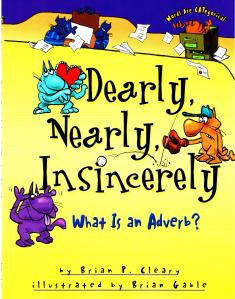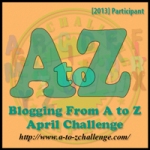Woohoo. There’s quite a bit of mud-slinging going on over yonder about adverbs, of all things.

What with being called all kinds of dubious, diminishing, and insulting names on Internet, like “ad-thingies,” “the red-headed stepchild of modern grammarians,” and “weasel words,” it’s a wonder adverbs don’t have an inferiority complex. Oh, wait, in fact they do exhibit previously undiagnosed, partly paranoid tendencies, probably because their feelings get hurt so frequently.
Not only do Internet writers negatively brand these mild-mannered modifiers with negative descriptors, but notorious well-known writers label them with such loaded nomenclature as “flabby words” (Hale) “stinkers” (Casagrande), and a “ragbag of hedges” (Kilgarriff). They have been called monsters and beasties, too.
Others fling disparaging remarks like flaming firecrackers tossed by taunting teenagers. Not only are adverbs “useless,” but they are “truly useless,” and “redundant.” Gordon calls them “yawningly predictable,” and Zinsser calls them “unnecessary.”
Adverbs are “crashers in the syntax house party” and “trash words” (Hale), “the dustbin” of English grammatical categories (Crystal), “the old worn-out clasp which holds words together” (Folejewski, quoted in Nordquist), “the poor stepchild” and the “Rodney Dangerfield of the parts of speech” (Nordquist).
Adverbs have even been called promiscuous because they have multiple partners: verbs, other adverbs, adjectives, and whole sentences. (Hale).
Mark Twain hated them and called them a plague. Stephen King hated them and jumped feet-first into the fracas ranting that “the road to hell is paved with adverbs.” Adverbs, he says, are like dandelions that totally, completely, and profligately cover his lawn.
(These guys are a bit melodramatic, don’t you think? Besides that, these frequently repeated quotes are becoming trite and clichéd. Enough already.)
And it doesn’t stop there either. People who innocently use adverbs reap heaps of disparaging labels: “linguistic dwarfs” use adverbs because they can’t quite connect with stronger verbs (Kilgarriff); “weak minds” use adverbs because they are lazy; (Outbreak movie); “timid,” “cautious,” and “fearful” writers use adverbs because, well, they are timid, cautious, and fearful (King).
Indeed, some published “immature” writers have been castigated for using weak verbs and redundant adverbs in their money-gushing published novels. Of course, these writers have no worries about such criticism; they are busy counting the mega moolah that arrives by railroad cars at their multi-million dollar mansions. They sip their martinis shaken, not stirred, on the veranda by the pool, thumbing their noses at those snobby don’t-use-adverbs critics.
I mean, if you were J. K. Rowling, wouldn’t you have the pompous and malicious Dunsley family (the miserly stepparents in Harry Potter and the Sorcerer’s Stone) describe themselves as “perfectly normal.” Fits, doesn’t it. Come on, where’s your spirit of fun?
Grammar snobs point fingers at grammar slobs. From their lofty position on their judgment thrones, they pick out the puny prattlings of printless peons beneath them. Sometimes the grammar snobs point fingers at each other, ranting on opposite points of view on the same topic.
Criticizing adverb use is akin to criticizing Strunk & White; it’s the popular thing to do. Both are juicy targets, ripe for criticism. S & W give simplistic advice (avoid the use of qualifiers…), and adverbs can be simple and trite.
Whoa now…. Let’s just stop and take a breath. With all this maelstrom of adverb criticism, do writers even dare to use them?
True. Writers do misuse adverbs, especially the –ly brand and those linked to “said”, but is that any reason to banish all adverbs to Stephen King’s fiery furnace? Why all the melodramatic fire and brimstone? Why all this bullying of adverbs?
Adverbs can be badly, awkwardly, redundantly, and even outrageously used by writers, but possibly, just possibly, could adverbs have any good qualities? Must they always be demoted to being the poor, pitiful underdogs in the linguistic world?
Critics focus on the minor crimes of adverb abusers and ignore the benefits that well-behaved adverbs freely and willingly offer to the world. Adverbs have a proper place in writing; in fact, we can’t do without them.
Why should writers care about adverbs?
Adverbs affect writing style, yes, for better or for worse and happily ever after. Selective use of adverbs creates well-crafted writing while indiscriminate use creates tedious, clichéd writing. Adverbs can bring subtle distinctions as well as major, dramatic distinctions. And besides that, clever use of adverbs makes me chuckle.
You have heard the quote “familiarity breeds contempt”; well, that’s what’s happened to adverbs. These words have become the plain-vanilla-ice-cream-cone-every-day-after-school treat. Repetitious. Monotonous. Boring. And yes, Ms. Gordon, yawningly predictable.
But make that an apple-blueberry-peach, honey nut Cheerios ice cream sundae with Heathbar–crunch-topping adverb, and you  have a different story.
have a different story.
“Adverbs add character, sizzle, and fizz to your phrase or your sentence, whatever it is!” Brian P. Cleary, Clearly, Dearly, Nearly, Insincerely: What Is an Adverb?
Brian Cleary may write children’s books, but he’s right about adverbs.
What is an adverb anyway?
Adverbs are a category of words (a part of speech) that can change (qualify, limit, describe, modify, intensify, minimize) the meaning of verbs, other adverbs, adjectives, phrases, and clauses.
I know. You learned that in third grade. But think about this: Anything that has the power to change something else has….power. Take hold of that power and use it wisely.
Take a gander at the following Zombie treats dissected from Kevin J. Anderson’s, Death Warmed Over, and slobber over the adverbs he uses.
1. Adverbs modify verbs
Most humans are morbidly fascinated by the dark side of the city.
Streetlights flickered ominously in an electric rhythm sure to trigger epileptic seizures…
2. Adverbs modify other adverbs
“Amazing what morticians can do these days, but I’m still only fit for the scratch-and-dent sale.” I tapped my brow, feeling the putty that Bruno had so skillfully applied.
3. Adverbs modify adjectives
The mummy spoke in a crisp Bristish accent, “So sorry I’m late. My sundial is notoriously unreliable on cloudy days.”
We assert that all spells published by Howard Phillips are completely harmless. Although Ms. Wannovich’s situation is unquestionably tragic, our good company bears no blame for the aforementioned misfortune.
4. Adverbs modify clauses
I had been inside the factory before—illicitly—while investigating the garlic-laced shampoo lawsuit.
To tell the truth, I never liked Zombie stories before I read Anderson’s Death Warmed Over. It is the perfect type of writing for tongue-in-cheek use of adverbs.
As Mark Twain once famously said about himself, “Reports of my death are greatly exaggerated,” reports of the death of adverbs are also greatly exaggerated.
Use adverbs, but use them wisely. Crime scene closed.
References:
http://www.guardian.co.uk/books/2010/feb/24/elmore-leonard-rules-for-writers/print
http://www.macmillandictionaryblog.com/new-years-resolution-no-adverbs (Kilgarriff)http://www.brainpickings.org/index.php/2013/03/13/stephen-king-on-adverbs/
http://grammar.about.com/od/basicsentencegrammar/a/adverbquotes.htm (Nordquist)http://www.macmillandictionaryblog.com/why-pick-on-adverbs (Rundell)http://chronicle.com/blogs/linguafranca/2013/02/20/being-an-adverb/ (Pullum)
Casagrande, June. Grammar Snobs are Great Big Meanies: A Guide to Language for Fun & Spite.
Clark, Roy Peter. Writing Tools: 50 Essential Strategies for Every Writer.
Gordon, Karen Elizabeth. The Deluxe Transitive Vampire: The Ultimate Handbook of Grammar for the Innocent, the Eager, and the Doomed.
Hale, Constance. Sin and Syntax: How to Craft Wickedly Effective Prose.
Zinsser, William. On Writing Well: The Classic Guide to Writing Nonfiction, Sixth Edition.
The Last Meow
I clearly, dearly, and sincerely approve this post. Now may I go back to my nap?
Meow for now. =<^;^>=
Posted in
English Class,
ESOL,
Grammar,
Writing and tagged
Adam Kilgarriff,
adverbs,
Elmore Leonard,
Geoffrey Pullman,
Karen Elizabeth Gordon,
Kevin J. Anderson,
Michael Rundell,
Richard Nordquist,
Roy Peter Clark,
Stephen King,
Strunk & White,
William Zinsser
 “? (Available from CafePress)
“? (Available from CafePress)
 (Harper Perennial, 1977 edition. Original copyright 1934). White is known for Charlotte’s Web, a book about a pig, a spider, and a young girl–a favorite with children everywhere. White is also known for his writings in the New Yorker and Harper’s magazine.
(Harper Perennial, 1977 edition. Original copyright 1934). White is known for Charlotte’s Web, a book about a pig, a spider, and a young girl–a favorite with children everywhere. White is also known for his writings in the New Yorker and Harper’s magazine. by William Strunk, Jr.
by William Strunk, Jr. with Bob Ossler Chaplain. Look for more information at
with Bob Ossler Chaplain. Look for more information at 



















![images[3]](https://janiceheck.files.wordpress.com/2013/05/images3.jpg?w=538)













